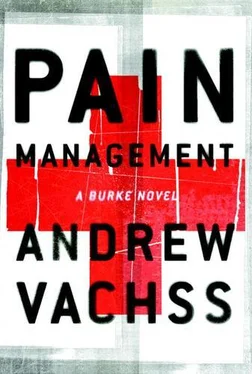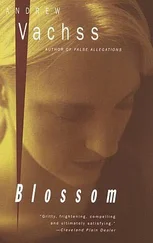I thought about trying it right away. Sometimes people on night duty get lonely, and they’re easier to talk to. But safehouse antennas extend higher when darkness comes, and I decided to take my shot in the daytime.
I thought about going home. But nobody would be there. And it wasn’t my home.
I had another idea, but it stumbled into the generation gap. When I was a kid on the streets, one place you could always find open in the middle of the night was a church. Not all of them, but there would always be a couple.
Not the ones I tried.
When Pansy had been with me, we sometimes watched the sun come up together. Facing the day. Now I watched it come up alone. And went to sleep.
It was a little after three in the afternoon when I rang the bell on the side of the three-story blue clapboard house. A woman, maybe in her twenties, answered, her body language making it clear that I wasn’t going to be invited in.
I gave her the same spiel I was handing out all over the streets. She nodded, not saying anything. I handed her a photo of Rosebud. She took it without even glancing at it. I thanked her for her time and left.
Her act was a little too cool and removed. And I didn’t have anything resembling a lead. So I was back that night.
Like so many other safehouses, they were hyper about their doors and windows, but didn’t pay much attention to anything past their immediate perimeter. Patience eventually dealt me the parking spot I needed. From the Ford’s front seat, I could triangle on both the front and side doors. They had incoming all night long. None of the girls looked anything like Rosebud. Nobody left after ten. Maybe a house rule?
I got out, walked around the block to where I could do a visual on the house, looking for openings. I did the risk-gain math. There wasn’t a scrap of evidence that Rosebud was there. And the place had to have some security.
Maybe some other time.
One of Portland’s real fine Mediterranean restaurants, Touché, has a poolroom upstairs. The tables are just props—nobody would play a serious game there, much less for serious money. But I’d heard the place drew a lot of college girls, so I thought it was worth a once-over.
The sound system was good, if a bit strong. The mix was eclectic—probably Napstered and burned onto CDs—but whoever put it together knew what they were doing. When the tracks switched to doo-wop, I almost felt at home.
“Please Say You Want Me” came on, the kid singing lead working a deeper vein than Frankie Lymon had ever mined. I overheard one of the women hanging out ask, “Who’s that ?” I didn’t say anything. But then one of the upscale lounge lizards told her, “That’s the Students. Mid-fifties stuff.”
I turned slightly, saying, “No, that was the Schoolboys. The Students were the guys who did ‘I’m So Young.’ “
The lounge lizard muttered something about me being old enough, I’d probably heard them in person.
Maybe not, I thought to myself, but I sure as hell am getting old, opening my fool mouth in public like that.
My hole card wasn’t exactly the ace of trumps, but holding it back any longer wasn’t going to raise its value. So, the next morning, I shaved carefully, used the flesh-color stuff Michelle had given me on the bullet scar under my right cheekbone, and put on a pair of nonprescription glasses with a faint gray tint. It didn’t turn me into Mr. Rogers, but with the light canvas sports coat over a white T-shirt and a pair of stonewashed jeans, I could pass as a local at first glance.
Flacco and Gordo had lent me an egg-yolk-yellow Camaro. In Portland, it would be a lot less conspicuous than the Ford. I hadn’t driven one of the new ones before, and I was surprised at how damn big it was—the front end seemed to stretch on forever. Even at around-town speeds, it rode stiff.
I found a perfect spot on a rise overlooking the campgrounds. Too far away to pick out individuals, but close enough to see the group activities.
I fitted the rubber-covered little 83 monocular to my eye, focused it down, and breathed shallow until I got it steady enough to scan.
They were playing softball. The left-fielder looked a lot like Daisy, but I couldn’t be sure from the angle I had. When the inning was over, I followed her all the way to the bench. Yes.
Daisy didn’t seem especially interested in the game. She just sat there pensively, while her teammates shouted and waved their arms and jumped up and down at the slightest sign of activity from each batter.
I played the scope over the area, looking for a likely spot. It had to be a dead-drop system they were using. There’d been no phone in Daisy’s room, and it didn’t seem like the kid was ever home alone anyway. This was the one place she went to every day. One place where her parents were never around. And the supervision didn’t seem all that intense.
A low, crumbling stone wall decoratively separated the playing fields from a rambling one-story structure. I took that to be the place where they had the indoor activities. Beyond the outfield was a thick stand of mature trees. The grounds were unfenced—easy enough to come by at night and leave a note to be picked up the next day.
They were playing slow-pitch, but the tall girl on the mound made a high parabolic arc out of each serve, and most of the batters whiffed. Not Daisy. She waited patiently for the ball to drop, stepped into it, and drove it hard through the right side of the infield. When the outfielder was a bit slow in coming to the ball, Daisy took a wide turn at first and steamed into second standing up. Her teammates on the sidelines seemed a lot more excited about her hit than she was.
The next batter popped up to shallow left. Daisy never hesitated, charging so hard she was around third and heading home by the time the fielder dropped the ball. The run triggered a wild celebration. I could see the coach—a teenage girl in shorts and a bright-green sweatshirt with some kind of logo on it—saying something to Daisy. It didn’t look like congratulations. Probably telling Daisy she shouldn’t have taken off—what if the fielder hadn’t dropped the ball? Daisy wasn’t arguing, but she didn’t look real interested.
They changed sides again, and Daisy went back to her position in the outfield. I watched her for signs of anxiety, but she didn’t glance around, didn’t fidget—just concentrated on each batter as they came up. I couldn’t tell how far along in the game they were, and I didn’t like sitting out there in the open. I backed the Camaro out and made a slow circle of the grounds until I found a good spot maybe a quarter-mile away.
I parked, locked up, and started walking. The woods were deeper than they’d looked from the other side, but it was no problem finding my way back with the noise of the game to guide me. I marked my way with quick spurts of red paint from the little spray can I carried. Being a strict environmentalist, I didn’t deface any of the trees, just the NO TRESPASSING signs.
When I found a direct sight line to Daisy, I sat down with my back against a tree and did what I do best.
“Daisy!” I heard someone shout.
She ignored the noise, trotting toward the woods, in no special hurry. Wherever she was headed was past where I was waiting, because she practically stomped on me as she went by.
“Hey!” she yelped.
“Easy, Daisy. You know who I am.”
She pulled up short, hands behind her back, watching me warily but not making a sound. Maybe she didn’t want to alert the camp counselors to where she was. I kept my hands loose in my lap, projecting waves of calm out to her.
“What are you . . . ? I mean, how come . . . ?”
Читать дальше











